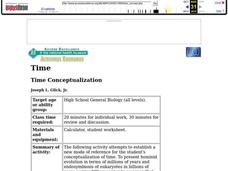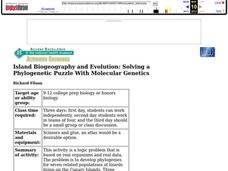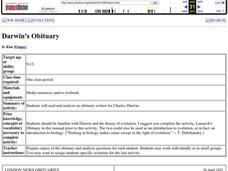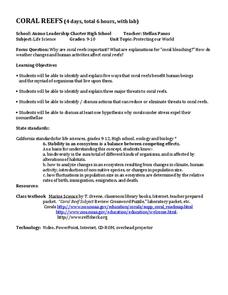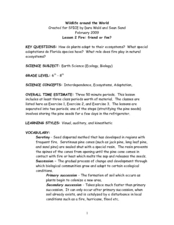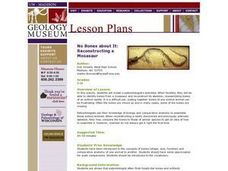Curated OER
Time Conceptualization
Students use this activity to establish a new mode of reference to the conceptualization of time. To present hominid evolution in terms of millions of years and endosymbiosis of eukaryotes in billions of years carries little meaning to...
Curated OER
Dinosaur Tracks: From Stride To Leg Length To Speed
Students determine the relationship between leg length, stride length, and speed in humans and bipedal dinosaurs. They collect data and graph these human characteristics then use actual data collected from dinosaur track pads and fossils...
Curated OER
Mimicry: An Example of Adaptation
Students are able to explain the relationship between adaptation and ability for survival and reproduction. They are able to give examples of a series of adaptations that would support the idea that evolution is a series of minor...
Curated OER
Viruses and Host Evolution
Students are organized into groups of four. On Day 1 they are given a worksheet about viruses and their effects on the evolution of a rabbit population. After about 30 minutes of group work, a class discussion of the material begins. ...
Curated OER
Peter Rabbit Meets Charles Darwin
Young scholars start to think of evolution in terms of populations. The class follows a cartoon scenario of a rabbit population in which there is selection and change of gene frequency. They receive copies of the scenario or the whole...
Curated OER
Island Biogeography and Evolution
Students use this activity as a logic problem that is based on real organisms and real data. The problem is to develop phylogenies for seven related populations of lizards living on the Canary Islands. Three phylogenetic charts are...
Curated OER
Island Biogeography and Evolution: Solving a Phylogenetic Puzzle With Molecular Genetics
Students engage in solving a logic problem based on real organisms and real data. They develop phylogenies for seven related populations of lizards living on the Canary Islands.
Curated OER
Darwin's Obituary
Learners read and analyze an obituary written for Charles Darwin. They make a list of facts about Darwin they learned from the obituary. Students compare Lamarack's theory to Darwin's.
Curated OER
Cell 5 Diffusion and Osmosis
Students distinguish between active and passive transport. Students identify key words associated with active and passive transport. They draw and explain the structure f the cellular membrane. They are able to define phospholipid...
Curated OER
Coral Reefs
Students research coral reefs and identify their benefits to humans, threats to the reef, how to reduce and eliminate threats, and more. In this coral reef lesson plan, students research the reefs, and take a field trip to an aquarium.
Curated OER
Bioplastics
Learners define bioplastics and identify its uses. In this bioplastics lesson, students compare and contrast styrofoam to starch peanuts after careful examination. Learners understand what biodegradeable means.
Curated OER
Wildlife Around the World
Young scholars examine how plants are able to adapt to their ecosystem and the role that fire plays in changes through the years. In this ecosystem lesson students complete several exercises focussing on plants and their adaptations to.
Curated OER
Being Productive in the Arctic Ocean
Students identify the three realms of the Arctic Ocean, and describe the relationships between these realms. They identify major factors that limit primary productivity in the Arctic Ocean.
Curated OER
Survivors on the Ocean Ridge
Students discover the uniqueness of deep sea hydrothermal vent organisms through an exploration of the NOAA Galapagos Rift Expedition. They study the genetics and evolution of a shrimp species that lives near the vents then they...
Curated OER
Polar Bear Panic!
Students identify the three realms of the Arctic Ocean, and describe the relationships between these realms. They graphically analyze data on sea ice cover in the Arctic Ocean, and recognize a trend in these data.
Curated OER
No bones About It -A Mosasaur
Students model a paleontologist's activities. They identify dinosaur bones and reassemble them into a skeleton of an extinct reptile.
Curated OER
Shadows of North Carolina's Past
Students construct a timeline of four major culture periods in Native American history from studying archaeological evidence cards.
Curated OER
Risk Factor Roulette
Students examine "multiple chemical sensitivity" and how it relates to genetic variation and environmental factors. They read an article, conduct research, and identify risk factors related to chemical sensitivity, asthma, breast cancer,...
Curated OER
Basic Introduction to Foundation of Life: Genes, Genetics and Genetic Diseases
Students are introduced to genetics along with genetic diseases and heredity. In groups, they complete a Punnett Square to determine the dominant and recessive genes. After viewing diagrams, they identify the characteristics of DNA and...
Curated OER
Thumbs Up, Thumbs Down: Grasping the Idea of Evolution
Students compare and their performance of a series of tasks using their thumb and fingers to their performance of the same tasks without the use of their thumb. The class discussion that follows the activity defines and discusses the...
Curated OER
The Electrophoresis of Human Hemoglobin
High schoolers are presented with a scenario that requires them to electrophoreses human hemoglobin samples in order to confirm a diagnosis of sickle cell anemia and/or to determine whether individuals in the scenario are carriers of the...
Curated OER
Camouflage and Protective Coloration: A Model of Natural Selection
Students study protective coloration and camouflage in animals. They create examples of each and conduct simulation-type experiments to determine which is the most effective adaptation.
Curated OER
The Food Chain Game - A Lesson in Ecosystems
Students are divided into three groups, herbivores, omnivores, and carnivores which receive a certain number of lives. Once in their ecosystem (outside or the gym), the carnivores chase and eat either the herbivores or omnivores, the...
Curated OER
Carbon Monoxide and Population Density
Tenth graders investigate the carbon monoxide level at a fixed latitude to determine if there is a relationship to population density. They download data sets and generate a graph, and find locations using the Earth's coordinate system....
Other popular searches
- Plant Biology Vocabulary
- Biology Vocabulary Words
- Ap Biology Vocabulary
- Biology Vocabulary Genetics
- Biology Vocabulary Review
- Biology Vocabulary Lessons
- Biology Vocabulary 98
- Biology Vocabulary Prefixes
- Biology Vocabulary Bacteria
- Biology Vocabularyv 98


